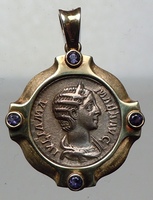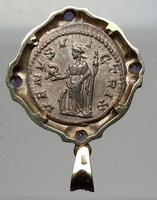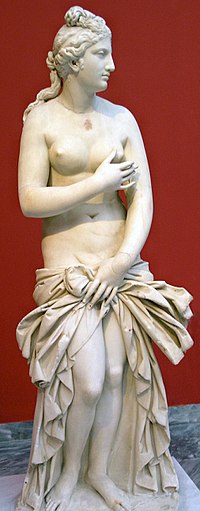Julia Mamaea Roman Empress Severus Alexander mother Ancient Coins
for Sale for Collection or Numismatic Investment
Buy Julia Mamaea Roman Empress coins from a trusted
ancient coin dealer. as the second daughter of Julia Maesa, a powerful
Roman woman of Syrian Arab origin and Syrian noble Julius Avitus. She
was a niece of empress Julia Domna and emperor Septimius Severus and
sister of Julia Soaemias. She was born and raised in Emesa (modern Homs,
Syria).
You can find more about Gordian III watching the vide below
All coins you purchase from the store are professionally researched,
photographed and provided with a lifetime guarantee of authenticity.
 
Modern 14 Karat Gold Pendant with 4 Iolite Stones
Total Weight with Coin 7.69 grams (coin by itself approximately 2.6
grams)
3.5 x 2.6 centimeters
Set with:
Example of Authentic Ancient Coin of:
Julia Mamaea - Roman Empress wife of Emperor Severus Alexander 222-235
A.D. -
Silver Denarius Rome mint: 222-235 A.D.
Reference: RIC 358 (Severus Alexander), S 8216
IVLIA MAMAEA AVG - Diademed, draped bust right.
VENVS VICTRIX - Venus standing left, holding helmet and scepter; shield
to left.
* Numismatic Note: The coin itself is in an impressive
state of preservation with a great strike and gorgeous reverse. The
reverse features one of the favored goddesses that even Julius Caesar
claimed his decent from and admired. This coin shows that even in those
times this goddess got a lot of veneration. The workmanship on the
actual pendant is exquisite as it takes a great expert to design such a
beautiful mount, custom fitting this beautiful coin! This may make a
wonderful gift for the woman you love.
As the transparent variety iolite, it is often used as
a
gemstone. The name "iolite" comes from
the Greek word for violet. Another old name is dichroite, a Greek
word meaning "two-colored rock", a reference to cordierite's strong
pleochroism. It has also been called
"water-sapphire" and "Vikings' Compass" because of its usefulness in
determining the direction of the sun on overcast days, the Vikings
having used it for this purpose. This works by determining the direction
of
polarization of the sky overhead. Light
scattered by air molecules is polarized, and the direction of the
polarization is at right angles to a line to the sun, even when the
sun's disk itself is obscured by dense fog or lies just below the
horizon.
Venus
was a
Roman
goddess principally associated with
love,
beauty and
fertility, who played a key role in
many
Roman religious festivals and myths.
From the third century BC, the increasing
Hellenization of Roman upper classes
identified her as the equivalent of the
Greek goddess
Aphrodite.
 Her
cult began in
Ardea and
Lavinium,
Latium. On August 15, 293 BC, her
oldest known
temple was dedicated, and August 18
became a festival called the
Vinalia Rustica. After
Rome's
defeat at the
Battle of Lake Trasimene in the opening
episodes of the
Second Punic War, the Sibylline oracle
recommended the importation of the Sicillian Venus of Eryx; a temple to
her was dedicated on the
Capitoline Hill in 217 BC: a second
temple to her was dedicated in 181 BC. Her
cult began in
Ardea and
Lavinium,
Latium. On August 15, 293 BC, her
oldest known
temple was dedicated, and August 18
became a festival called the
Vinalia Rustica. After
Rome's
defeat at the
Battle of Lake Trasimene in the opening
episodes of the
Second Punic War, the Sibylline oracle
recommended the importation of the Sicillian Venus of Eryx; a temple to
her was dedicated on the
Capitoline Hill in 217 BC: a second
temple to her was dedicated in 181 BC.
Venus seems to have played a part in household or private religion of
some Romans. Julius Caesar claimed her as an ancestor (Venus Genetrix);
possibly a long-standing family tradition, certainly one adopted as such
by his heir
Augustus. Venus statuettes have been
found in quite ordinary household shrines (lararia). In fiction,
Petronius places one among the
Lares
of the
freedman
Trimalchio's household shrine.
Julia Avita Mamaea (14 or 29 August after
180235) was the second daughter of
Julia Maesa, a powerful
 Roman
woman of
Syrian
Arab origin and Syrian noble
Julius Avitus. She was a niece of
empress
Julia Domna and
emperor
Septimius Severus and sister of
Julia Soaemias. She was born and raised
in
Emesa (modern
Homs,
Syria). Roman
woman of
Syrian
Arab origin and Syrian noble
Julius Avitus. She was a niece of
empress
Julia Domna and
emperor
Septimius Severus and sister of
Julia Soaemias. She was born and raised
in
Emesa (modern
Homs,
Syria).
Julia's first husband was a former consul (whose name
is unknown) who died. Julia married as her second husband Syrian
Promagistrate
Marcus Julius Gessius Marcianus. Julia
bore Marcianus two children, a daughter called Theoclia (little is known
of her) and a son, Marcus Julius Gessius Bassianus Alexianus, later
emperor
Alexander Severus. Unlike her sister,
Julia Mamaea was reported to be a virtuous woman, never involved in
scandals.
As a member of the Imperial Roman family, she watched
closely the death of her cousin
Caracalla and the ascent to power of
her nephew
Elagabalus, the oldest grandson of
Julia Maesa and her choice to the throne. Eventually Elagabalus and his
mother Julia Soaemias proved incompetent rulers and favour fell on
Alexander, Julia's son. He became emperor in 222, following Elagabalus'
murder by the
Praetorian Guard. Julia and her mother
became regents in the name of Alexander, then 14 years old. Upon
adulthood, Alexander confirmed his esteem for his mother and named her
consors imperii (imperial consort). It was in this condition that
she accompanied her son in his campaigns: a custom started with
Julia Domna. Thus she travelled to the
East, for the campaign against
Parthia and to the Germania provinces.
Julia Mamaea was with Alexander in Moguntiacum (modern
Mainz), capital of
Germania Superior, when he was
assassinated by his troops. She suffered the same fate.
|